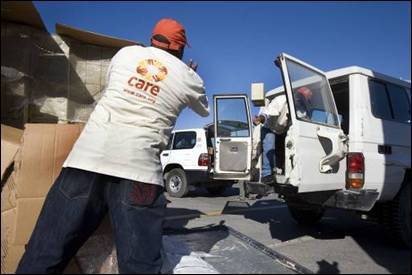By Melanie Minzes | Director of Development
Background The January 12th earthquake that devastated Haiti is one of the largest humanitarian disasters in recent years, both in terms of numbers of people affected and the magnitude of damage. Current estimates are that one in three Haitians are affected (approximately 3 million people living in and around the capital city of Port-au-Prince). Some 80,000 people are confirmed dead, and this number is expected to increase significantly in the days and weeks to come.
CARE, which has worked in Haiti since 1954, launched an immediate response to help earthquake survivors. Thankfully, all of CARE’s 133 staff members are safe and accounted for, although many lost relatives, including children, as well as their homes. CARE’s staff in Haiti includes emergency personnel who were part of the response to the devastating Hurricane Hanna in 2008. In addition to our staff already in Haiti, we have deployed an experienced emergency team that has allowed us to start providing emergency assistance while planning for longer-term recovery.
The purpose of this update is to provide more details on CARE’s efforts to date.
Update from Haiti General Emergency Response · The scale of devastation caused by Tuesday’s earthquake in Haiti is horrifying. Aid workers on the ground say the extent of the damage to homes and infrastructure is reminiscent of the damage caused by the 2004 tsunami in South Asia.
· The situation poses a huge logistical challenge. Getting in enough aid supplies, equipment and staff is difficult, as the airport and port have been severely damaged. Electricity and water have been cut off, fuel supplies are low, and roads are impassable.
· Despite these challenges, aid is getting through, and more emergency workers and aid shipments are arriving. The port is expected to be operational in two days and the government plans to open 40 banks today. Western Union is waiving charges for remittances to Haiti, and T-Mobile is providing free text messaging between Haiti and the US through January.
· CARE has distributed clean water, water purification packets, emergency food rations, and basic hygiene kits, as described below. Soon we will begin distributing tents, mattresses and other relief items.
CARE’s Response · CARE has given clean water and water purification packets to 25,000 people.
· We have started distributing: – 10-tons of high-protein biscuits, enough for 60,000 emergency meals to people in need; – 1,500 collapsible water containers; and – 1,200 hygiene kits, with a special focus on the needs of women.
· We also have procured 5,000 mattresses, which will soon be distributed.
· There are 37,000 pregnant women in the disaster zone who are in urgent need of food, safe water and access to health care. CARE is working hard to support their needs.
· We are in the process of acquiring and bringing in more supplies, such as jerry cans, tents, temporary warehouse structures, generators and high-protein biscuits from places like Dubai, Karachi and Nairobi.
· The CARE Haiti team has begun planning for the longer-term response; in the near term, this could include activities such as rebuilding homes and implementing a cash-for-work program for people to help clear debris.
Gender Focus · To help meet the specific needs of pregnant women, new mothers and children, CARE is focusing on the following as part of our immediate emergency response: – distribution of water purification tablets to provide clean water, particularly for pregnant women and children who are particularly susceptible to water-borne illness such as diarrhea; – distribution of emergency food rations; – distribution of infant kits for mothers with newborns and young babies; and – distribution of hygiene kits that include soap and toothpaste, sanitary napkins and undergarments for women.
· We know that in emergencies like this, women and girls are at increased risk of sexual violence, exploitation and abuse when seeking food and other services. CARE is deploying a gender-based violence specialist to enhance our ability to address these issues.
· After disasters, CARE normally provides delivery kits for women and health centers to facilitate safer, cleaner deliveries. We are working with partners to determine how to procure these items and distribute them as quickly as possible.
Health Focus · Port-au-Prince lacks sewer infrastructure and the massive quake ruptured water lines. This creates a perfect formula for the spread of water-borne disease, particularly as those left homeless are forced into close quarters with limited options for sanitation.
· CARE is working quickly to distribute water purification packets along with basic hygiene kits to help prevent a secondary crisis: the outbreak of disease.
· Safe water is crucial for every survivor of last Tuesday’s quake – but especially for pregnant women, new mothers and small children. We are concerned that women may stop breastfeeding because they do not have enough food or water themselves, posing a huge risk to newborns.
· Mounting garbage adds to the risk of disease. Throughout Haiti, garbage trucks stand idle and the gutters are clogged with plastic bags, bottles and trash of all kinds. People tie handkerchiefs over their faces, desperately trying to stem the overwhelming stench. We urgently need to address the waste disposal issue. If garbage keeps accumulating, it will certainly spread disease.
Project reports on GlobalGiving are posted directly to globalgiving.org by Project Leaders as they are completed, generally every 3-4 months. To protect the integrity of these documents, GlobalGiving does not alter them; therefore you may find some language or formatting issues.
If you donate to this project or have donated to this project, you can receive an email when this project posts a report. You can also subscribe for reports without donating.
